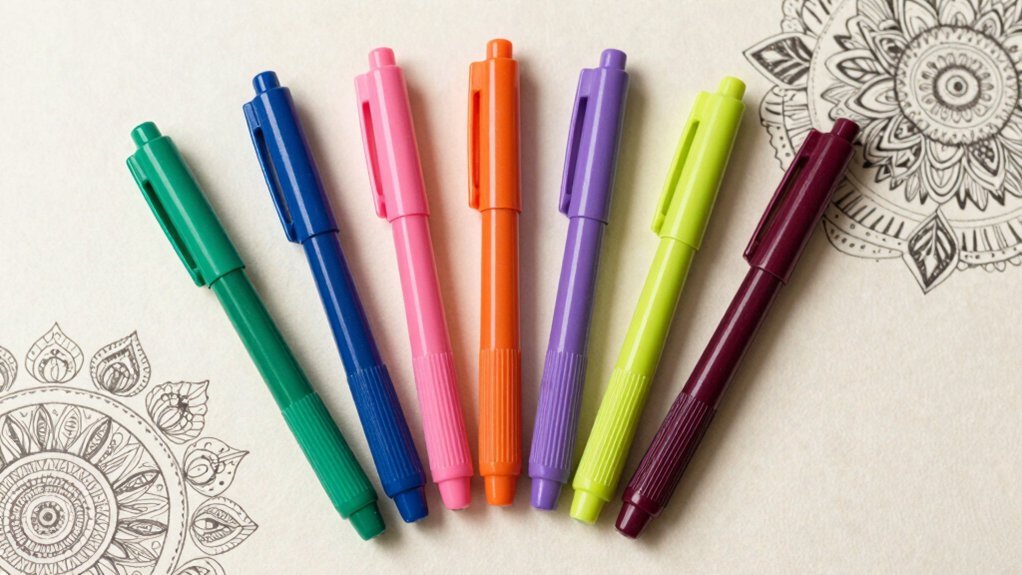Gratitude journaling can help reduce your anxiety by shifting your focus from worries to positive experiences. By regularly writing down what you're thankful for, you cultivate a more optimistic mindset. This practice fosters mindfulness, allowing you to break free from cycles of negative thoughts. You also gain clarity on your feelings, making it easier to manage stress and promote emotional balance. Many people report feeling more empowered and capable of handling life's challenges after starting this journaling habit. If you're curious about practical tips and inspiring success stories, there's much more to explore.
Understanding Anxiety and Its Effects

Anxiety can creep into your life in various ways, affecting your thoughts, emotions, and even physical health. You might notice a constant sense of worry or fear that doesn't seem to go away, making everyday tasks feel overwhelming. This persistent anxiety can lead to racing thoughts, causing you to struggle with concentration or decision-making.
Emotionally, you may experience irritability, restlessness, or a feeling of impending doom. These feelings can isolate you, making it hard to connect with others.
It's not just in your mind; anxiety often manifests physically, too. You might face symptoms like headaches, muscle tension, or gastrointestinal issues, all of which can exacerbate your emotional state.
Understanding how anxiety impacts you is essential for managing it effectively. When you recognize the signs and symptoms, you can start to address them proactively.
You'll find that acknowledging your anxiety gives you a sense of control. Instead of letting it dictate your life, you can take steps toward coping strategies that work for you.
This awareness lays the foundation for exploring solutions, like gratitude journaling, which can help shift your focus and improve your overall well-being.
The Concept of Gratitude Journaling
Gratitude journaling is a simple yet powerful practice that involves writing down things you're thankful for.
This approach not only enhances your mood but also offers psychological benefits, like reducing anxiety.
Let's explore how you can implement this practice effectively in your daily routine.
Definition of Gratitude Journaling
Journaling can be a powerful tool for transforming your mindset, especially when it focuses on gratitude.
Gratitude journaling is the practice of regularly writing down things you're thankful for. It encourages you to reflect on positive experiences, fostering a habit of appreciation in your daily life.
This practice typically involves setting aside a few minutes each day to jot down specific moments, people, or things you value. You might write about a kind gesture from a friend, a beautiful sunset, or even a simple cup of coffee that brought you joy.
The key is to be intentional and specific, as this deepens the impact of the exercise.
Psychological Benefits Explored
Engaging in gratitude journaling offers significant psychological benefits that can help alleviate anxiety. When you take time to reflect on what you're grateful for, you shift your focus from negative thoughts to positive experiences. This simple act can foster a sense of well-being and enhance your overall mood.
By regularly noting things you appreciate, you create a more optimistic mindset, which can counteract feelings of anxiety. You'll start to notice patterns of positivity, allowing you to reframe your perspective on stressful situations. This shift can empower you to respond to challenges with greater resilience.
Additionally, gratitude journaling promotes mindfulness. As you concentrate on specific moments of gratitude, you anchor yourself in the present, which reduces rumination and anxiety about the past or future. This practice encourages self-reflection, helping you understand your emotions better and recognize triggers that contribute to anxiety.
Ultimately, gratitude journaling serves as a powerful tool for enhancing emotional regulation. By developing a habit of gratitude, you cultivate a more balanced emotional landscape, arming yourself with the strength to face anxiety head-on.
Practical Implementation Tips
Starting a gratitude journal can feel intimidating, but it doesn't have to be complicated. To get started, find a notebook or use a digital app that you enjoy. Set aside a specific time each day—whether it's in the morning or before bed—to reflect on your day. Aim to write down three to five things you're grateful for. They can be as simple as a warm cup of coffee or a friendly smile from a stranger.
To make this practice effective, try to be specific. Instead of writing "I'm grateful for my friends," note a particular moment you shared that made you smile. This helps deepen your feelings of gratitude. Don't worry about grammar or style; focus on your feelings and experiences.
If you're feeling stuck, consider prompts like "What made me smile today?" or "Who helped me this week?" This can help trigger memories and emotions you might overlook.
Psychological Benefits of Gratitude

Gratitude has a profound impact on mental well-being, offering a pathway to reduce anxiety and enhance emotional resilience. When you actively recognize and appreciate the positive aspects of your life, it shifts your focus away from worries and negative thoughts. This simple practice can create a sense of joy and fulfillment, making it easier to cope with daily stressors.
Here's a quick overview of the psychological benefits you might experience:
| Benefit | Description |
|---|---|
| Improved Mood | Regularly practicing gratitude can elevate your overall mood, reducing feelings of sadness or anxiety. |
| Enhanced Self-Esteem | Acknowledging what you're grateful for boosts your self-worth and confidence, providing a more positive self-image. |
| Better Relationships | Gratitude fosters deeper connections with others, promoting empathy and reducing feelings of isolation. |
How Journaling Reduces Anxiety
Journaling offers a practical way to harness the benefits of gratitude while also addressing anxiety directly. When you put pen to paper, you create a safe space to explore your thoughts and feelings. This process can help you identify triggers and patterns that contribute to your anxiety.
Consider these ways journaling can reduce anxiety:
- Clarifies thoughts: Writing helps you articulate what's on your mind, making it easier to understand your feelings.
- Promotes mindfulness: Focusing on your writing encourages you to stay present, which can reduce anxious thoughts about the past or future.
- Encourages problem-solving: By reflecting on challenges, you can brainstorm solutions, empowering you to take control of your anxiety.
- Tracks progress: Regular journaling lets you see improvements over time, reminding you that you can manage anxiety effectively.
As you cultivate a habit of journaling, you'll likely find that your worries feel more manageable.
It's an empowering practice that not only fosters gratitude but also serves as a powerful tool for handling anxiety. Make journaling a part of your routine, and watch how it transforms your emotional landscape.
Practical Tips for Gratitude Journaling

To make the most of gratitude journaling, you'll want to establish a daily writing routine that fits your lifestyle.
Focus on the positives in your life, no matter how small, to shift your mindset.
Daily Writing Routine
Establishing a daily writing routine can greatly enhance your gratitude journaling practice. By setting aside a specific time each day, you create a consistent habit that helps you focus on what you're thankful for.
Here are some practical tips to get started:
- Choose a time that works for you: Whether it's in the morning, during lunch, or before bed, find a moment that fits your schedule.
- Keep your journal accessible: Having your journal nearby makes it easier to write whenever inspiration strikes. Consider keeping it on your nightstand or in your bag.
- Set a timer: Start with just five minutes a day. As you get comfortable, you can gradually increase the time you spend journaling.
- Limit distractions: Turn off your phone or find a quiet space to help you focus and reflect on your thoughts without interruptions.
Focus on Positives
Focusing on the positives can transform your gratitude journaling experience into a powerful tool for managing anxiety. When you zero in on what's good in your life, you shift your mindset from worries to appreciation.
Start by listing three things each day that you're grateful for. They can be as simple as a warm cup of coffee or a kind word from a friend. This practice helps you recognize the small joys that often go unnoticed.
Try to be specific in your entries. Instead of writing, "I'm grateful for my family," explore deeper: "I'm grateful for my sister's support during tough times." This specificity enhances the emotional impact of your reflections.
Consider adding a section to reflect on why you feel grateful. Understanding the reasons behind your gratitude can solidify those feelings and help you cultivate a more positive outlook.
If you encounter a tough day, don't hesitate to jot down even the tiniest positives. Acknowledging the good, no matter how small, can create a powerful shift in your emotional state.
Over time, you'll build a reservoir of positivity to draw from during anxious moments.
Set Realistic Goals
Setting realistic goals for your gratitude journaling can make the process more enjoyable and effective. When you set goals that are achievable, you're more likely to stick with the practice and truly benefit from it.
Here are some tips to help you set those goals:
- Start small: Aim to write just one or two things you're grateful for each day. This keeps it manageable and less overwhelming.
- Be specific: Instead of general statements, focus on particular moments or experiences. For example, write about that delicious cup of coffee you'd this morning, not just "I'm grateful for coffee."
- Choose a time: Pick a specific time each day to journal. Whether it's in the morning or before bed, consistency can help you form a habit.
- Reflect weekly: Take a moment each week to reflect on your entries. This can deepen your appreciation and help you recognize patterns in what brings you joy.
Success Stories and Testimonials
Many individuals have turned their lives around by incorporating gratitude journaling into their daily routines. You might be surprised to learn how many people have experienced a significant reduction in anxiety simply by taking a few moments each day to reflect on what they're thankful for.
For instance, one woman shared that after just a month of journaling, she felt a shift in her mindset. Instead of fixating on her worries, she began to recognize the small joys in her life, which helped to ease her anxiety.
Another individual recounted how gratitude journaling helped him break the cycle of negative thoughts. By focusing on positive experiences, he found it easier to manage stress and anxiety triggers.
Many users report that this practice not only boosted their mood but also improved their overall mental health.
These success stories show that gratitude journaling isn't just a trend; it's a transformative tool. If you're struggling with anxiety, you might find that dedicating a few minutes each day to express gratitude can lead to profound changes in your outlook and emotional well-being.
Why not give it a try? You could be the next success story!
Frequently Asked Questions
How Long Should I Journal Daily for Maximum Benefits?
You should journal for at least 10 to 15 minutes daily to reap maximum benefits. Consistency matters, so make it a habit, and you'll soon notice positive changes in your mindset and mood.
Can Gratitude Journaling Replace Professional Therapy for Anxiety?
Gratitude journaling can complement your therapy but can't replace it. It helps you focus on positives and manage stress, yet professional guidance remains essential for deeper issues. Combining both can enhance your mental well-being effectively.
What if I Struggle to Feel Grateful?
If you struggle to feel grateful, start small. Focus on simple things—like a warm cup of coffee or a sunny day. With practice, you'll find it easier to recognize and appreciate the positives in your life.
Are There Specific Prompts for Anxiety-Related Gratitude?
Yes, specific prompts can help you focus on gratitude. Try asking yourself what small joys you experienced today, who supported you recently, or what challenges taught you valuable lessons. These questions can shift your perspective.
How Can I Track My Progress With Gratitude Journaling?
To track your progress with gratitude journaling, set regular check-ins. Review past entries, notice patterns, and reflect on your feelings. Consider using a scale to measure your mood before and after journaling sessions.
In Summary
Incorporating gratitude journaling into your routine can be a powerful tool for managing anxiety. By focusing on the positives in your life, you shift your mindset away from worry and negativity. This practice not only enhances your emotional well-being but also fosters resilience against stress. So grab a notebook, jot down what you're thankful for, and watch how it transforms your perspective. Embrace the journey, and let gratitude guide you toward a calmer, more centered life.





Leave a Reply